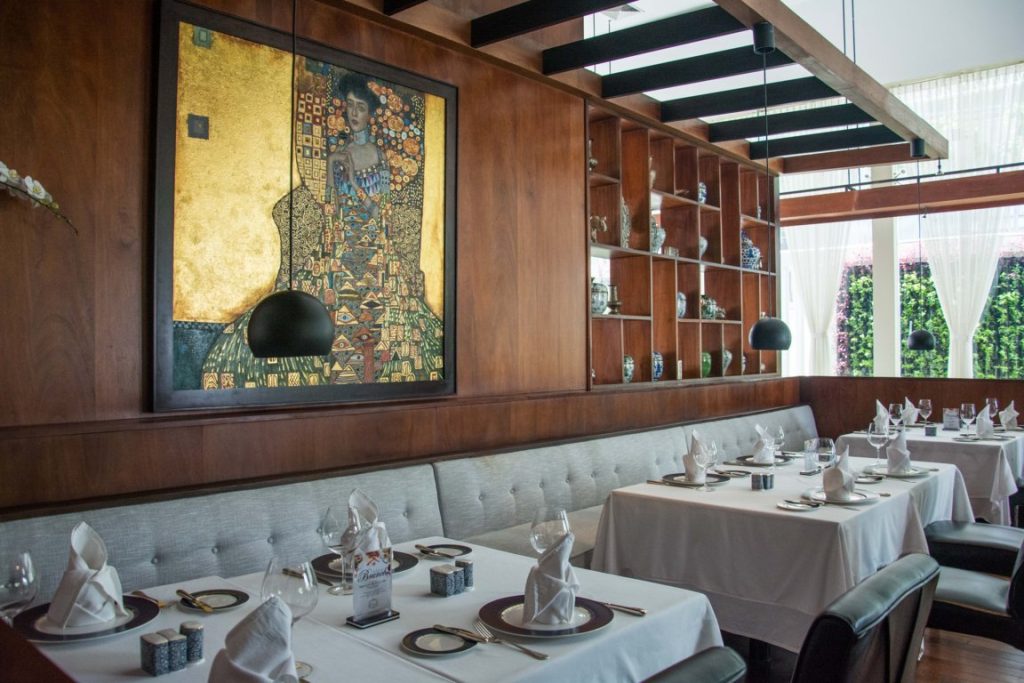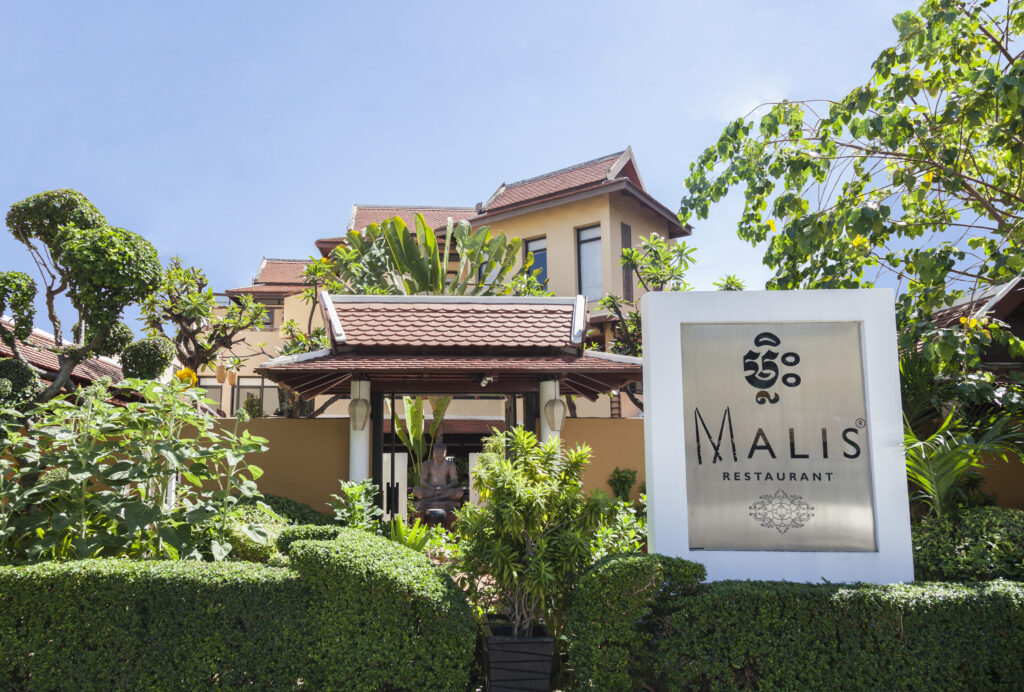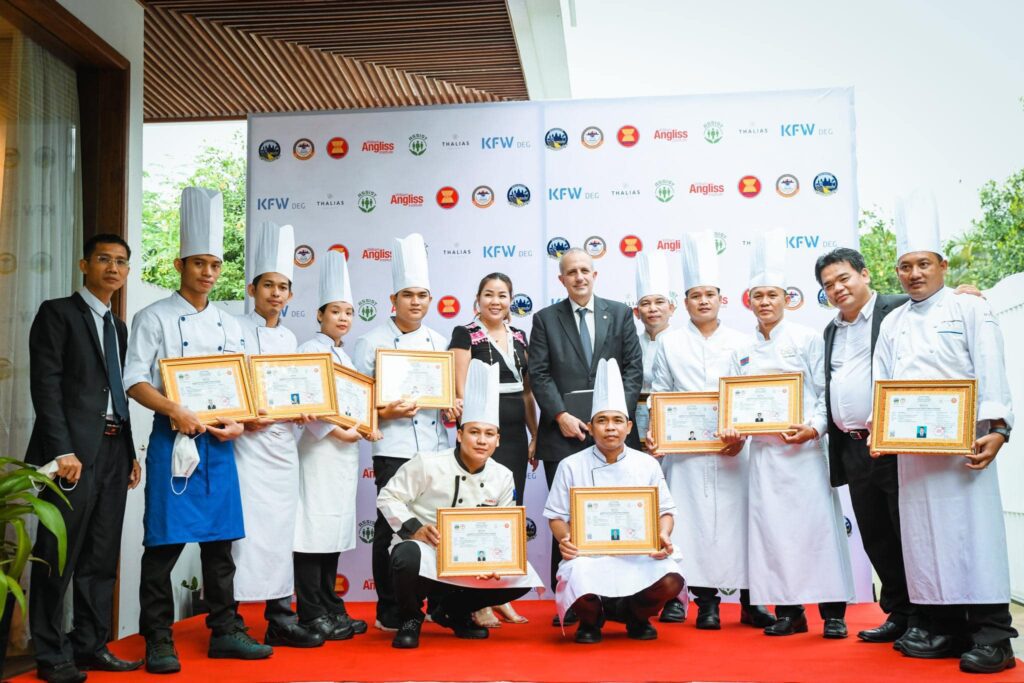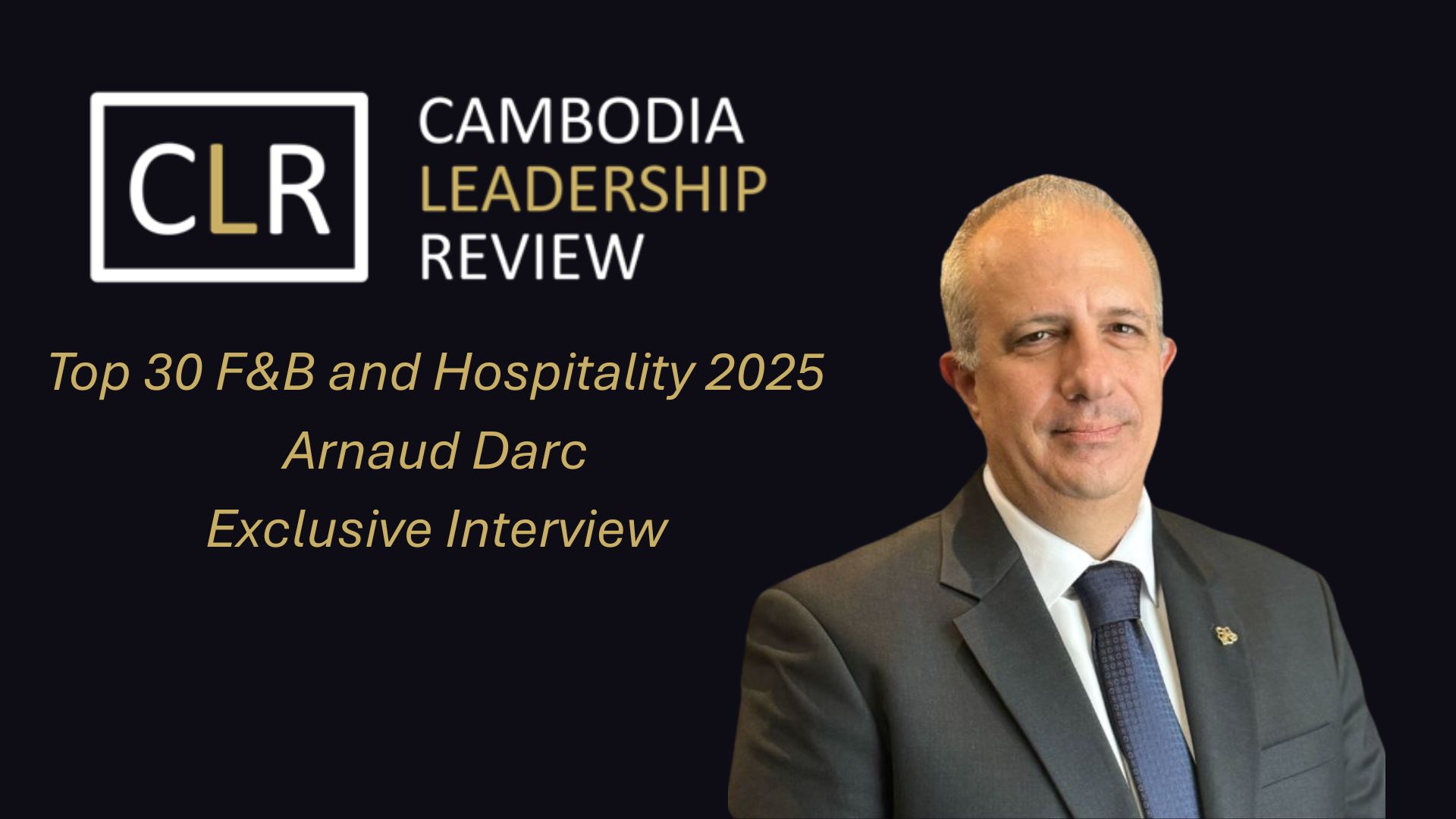Cambodia Leadership Review
Arnaud Darc has a three-decade journey in Cambodia and has helped define the country’s modern hospitality landscape. From launching iconic brands like Topaz, Malis, and Khéma to advocating for policy reform and talent development, Arnaud’s leadership is guided by unwavering values: clarity, care, and consistency.
As Cambodia’s culinary and service sectors evolve, Arnaud continues to shape not only a group of successful restaurants—but a national identity rooted in excellence, resilience, and cultural pride.
Leadership Values and Guiding Principles
CLR: Arnaud, as a leader in Cambodia’s restaurant and hospitality industry, what core values and guiding principles have shaped your leadership at Thalias Group? How have these principles contributed to the company’s success and its role as a leader in the sector?
When I first arrived in Cambodia in 1994, I had no roadmap; just a strong sense of values. Thirty years later, those same principles still guide every decision at Thalias: clarity, care, and consistency.
Clarity means knowing precisely why we exist. Each brand at Thalias was born to solve a local need: Topaz to define French fine dining in Phnom Penh; Malis to restore Khmer cuisine to its rightful cultural status; Khéma to democratize access to quality through everyday elegance. These missions are not decorative; they drive operations. When a guest’s experience doesn’t align with that purpose, we act. During our first years at Malis, some critics thought we were “softening” traditional dishes. But our goal was never replication. It was revival; treating Cambodian recipes with respect, technique, and pride. That clarity held us firm despite resistance and ultimately defined our identity.
Read More: Topaz Showcases Cambodia’s Evolving Hospitality Sector With ‘Top 100’ Listing
Care is not sentiment. It’s the discipline of attention. We train more than 200 staff annually and reinvest heavily in people; because hospitality is an ecosystem, not a transaction. During the 2020 COVID shutdown, when revenues dropped by over 90%, the easy option was to hibernate. But I refused to let our people drift. We retained 86% of our workforce, cross-trained waiters into logistics roles, and even piloted new product lines in our CPU. That crisis tested every principle we claimed to hold. And it confirmed them. Care, when it matters most, is action.
Consistency builds trust. It’s not about repetition; it’s about reliability. From our AI-assisted purchasing systems to the daily bread production at Khéma’s central kitchen, we’ve invested in processes that outlast personalities. When guests return to Topaz for an anniversary or bring family to Malis, they’re not chasing novelty. They’re trusting us to deliver what they remember; with the same quiet precision. That kind of trust isn’t built overnight; it’s earned one perfectly laminated croissant at a time.
Still, these values have been tested. In 2003, after expanding too quickly without adequate systems, we were forced to shut one of our ventures. It was a costly lesson; but a defining one. It reminded me that speed without structure is fragile. We regrouped, slowed down, and built stronger foundations. That setback still informs how I lead today.
Working in Cambodia taught me to adapt these principles to a local context. Here, trust is built over time; through relationships, not contracts. Regulatory frameworks can shift quickly, and talent development often means investing in people with raw potential rather than formal qualifications. But that’s also a strength. It forced me to lead with humility, to listen more, and to build systems rooted in shared purpose, not just imported models.
Looking ahead, these values aren’t just a legacy; they’re my compass. As we expand Khéma Go regionally and push for a Michelin-level Cambodian restaurant in Phnom Penh, the temptation will be to chase trends. But clarity will keep us grounded in identity. Care will ensure we bring our teams and suppliers with us. And consistency will protect the trust we’ve earned.
Leadership isn’t about avoiding mistakes. It’s about having a framework strong enough to guide you through them. That’s what these values offer; not perfection, but alignment. I don’t lead with noise or slogans. I lead with rhythm. Walks before sunrise. Calm reviews with my team. And the conviction that if we build with care and clarity, the results; growth, loyalty, trust; will follow.
So far, they have.

Challenges and Opportunities in the Restaurant Industry
CLR: The restaurant and hospitality industry in Cambodia is constantly evolving, with growing competition and shifts in consumer behavior. What do you see as the biggest challenges and opportunities for the industry in 2025, and how is Thalias Group positioning itself to stay ahead?
The hospitality industry is always evolving, but 2025 brings a different kind of complexity: One of the main challenges today is the pace at which new concepts appear—fast launches, flashy openings, a strong online presence. But often, they lack the foundations: no real training program, no supply chain discipline, no operational backbone. That’s speed without structure. At the same time, there’s a lot of visibility—posts, influencers, campaigns—but very little substance behind the guest experience. In Cambodia, this is amplified. The market is evolving fast. Urban growth is real, consumers are more informed, and yet the regulatory framework—tax, labor, hygiene—remains inconsistent and unclear. So we operate in an environment where you have to be both highly adaptive and deeply anchored. If you’re only fast, you burn out. If you’re only solid, you get left behind.
That requires strategic patience. And systems.
Another major challenge is human capital. Across the region, there’s a growing gap between what guests expect and what many teams are trained to deliver. Talent retention is difficult, especially in post-COVID economies. At Thalias, we’ve responded by doubling down on internal mobility. Today, 100% of our General Managers started with us in operational roles. We don’t just recruit; we grow. And we measure success not in hires, but in promotions.
There’s also the issue of cost. Food inflation, energy volatility, and logistics constraints make profitability harder to sustain without compromising quality. That’s where data becomes essential. We’ve implemented AI-assisted forecasting tools across our operations; from purchasing to portioning. This isn’t about replacing intuition; it’s about equipping our teams with sharper tools so we can make smart decisions in real time.
But where there are challenges, there are also deep opportunities.
The first is cultural pride. Post-pandemic, we see a stronger appetite; especially among younger Cambodians; for authentic, high-quality local cuisine. Malis has benefited from this shift, but we’re also seeing interest across our bistro and bakery lines. There’s a generation that doesn’t want French food instead of Khmer food; they want both—each with clarity and excellence.
This shift opens doors for more meaningful storytelling. People no longer dine out just for nourishment; they dine to learn, to connect, to experience something thoughtful. That’s why we’ve created wine and cheese nights at Khéma, chef’s table evenings at Topaz, and regional tasting menus at Malis. We don’t just serve food; we tell stories. And stories build loyalty.
The second opportunity is regional. With Khéma Go, we’re taking the production systems and culinary integrity we’ve developed over 15 years and scaling them. Not to become a chain; but to show that casual dining can be beautiful, consistent, and profitable across borders. Our first flagship outside Cambodia is under preparation. It will be led by a team that was cross-trained during the COVID shutdown—proof that crisis breeds capability, if you use the time well.
Third: the digital shift. The Cambodian consumer is more connected than ever. Online bookings, loyalty apps, e-commerce for F&B retail; these are no longer optional. We’ve invested heavily in the Thalias App and are exploring ways to make our artisanal products (like cheese and charcuterie) available online, with nationwide delivery. Our vision is not just “restaurant as venue” but “restaurant as platform.”
My advice for anyone entering this industry is simple: be clear on your purpose. The competition is not other restaurants; it’s attention. And attention only lasts if you deliver something meaningful, consistently. Don’t build what you think the market wants. Build what the market will remember. And then serve it, every day, with humility and discipline.
At Thalias, we’ve faced war, blackouts, SARS, economic downturns, and COVID. We’ve learned to adapt. But what protects us is not just resilience; it’s relevance.
Relevance comes from knowing who you are, serving with meaning, and building systems that endure. That’s how we face every new challenge; and how we seize every real opportunity.

New Developments at Thalias Group
CLR: What are some of the new initiatives or innovations happening at Thalias Group this year? How are these efforts helping the company enhance customer experiences and adapt to changing market trends?
At Thalias, we don’t innovate for the sake of novelty. We innovate to stay relevant; to serve better, think smarter, and strengthen the systems that support our teams and guests. This year, we are building in three directions: deeper operational integration, new consumer formats, and regional scaling.
First, our Central Production Unit (CPU) has entered its next phase. What began as a support facility has evolved into a full-fledged R&D and production hub; responsible for everything from our house-aged cheeses and charcuterie to sauces, condiments, and pastries. The CPU now supplies ten outlets daily and ensures quality uniformity across the group. In 2025, we’re expanding its role further, with an in-house fermentation lab, better cold-chain logistics, and a circular waste strategy in collaboration with local farms. This is not back-office work. It’s what allows us to serve thousands guests a week with consistency and transparency.
Read More: Arnaud Darc Nominated As Co-Chair Of Governments Law, Tax And Governance Working Group
Second, we’re launching PureBite; a healthy food delivery platform focused on nutrition, taste, and convenience. This is not a pivot; it’s a complement. PureBite is designed for a growing urban audience that wants clean meals, balanced macros, and ingredient traceability; all accessible through mobile ordering. It draws on our production capacity, our internal know-how, and the trust we’ve built over decades. Whether it’s cold-pressed juices, keto-friendly meals, or plant-forward Cambodian bowls, the goal is simple: to make health easier without making it elitist.
Khéma Go also continues to evolve. Originally launched during the pandemic as a survival response, it’s now a permanent brand with its own identity. We’ve streamlined packaging, improved e-commerce logistics, and integrated customer feedback loops via the Thalias App. The model is simple: artisanal quality, ready to go. And it’s working. In 2025, we’ll open our first Khéma Go flagship outside Cambodia. It will be led by a Cambodian operations team trained in Phnom Penh during the COVID downturn; a full-circle moment that proves long-term thinking pays off.
We’re also refining the experience at the table.
At Topaz, our chef’s table program is expanding. It’s no longer just a menu; it’s a dialogue. Guests meet the brigade, understand the sourcing, and experience the technical precision behind each dish. The goal is not to impress, but to involve. We’re pairing this with curated wine nights, regional French showcases, and behind-the-scenes kitchen tours for culinary students. Luxury, for us, is not about formality. It’s about presence.
At Malis, we’re going deeper into the roots of Khmer cuisine. This year, we’ve partnered with culinary historians and village elders to document regional recipes before they disappear. These recipes aren’t just being archived; they’re being reinterpreted for modern service: lighter, seasonal, but always authentic. The result is a new generation of Cambodian dishes that carry identity forward; not in a museum, but on a menu.
On the digital side, the Thalias App is becoming a full customer platform. What started as a loyalty tool now handles reservations, delivery orders, event bookings, and member-only perks. In the next quarter, we’ll integrate real-time order tracking, QR-based tableside payments, and a curated retail section for our artisanal goods. The future of dining is hybrid — digital ease, physical intimacy — and we’re building both sides.
Behind all of this is one constant: our people.
Every initiative; from PureBite to Malis research; is led by someone who came up through the system. That’s the real innovation. We don’t outsource growth; we cultivate it. Our goal is not to be everywhere. It’s to be clear, committed, and capable; wherever we are.
In a world where attention is fleeting, depth matters more than reach. And at Thalias, innovation isn’t something we announce. It’s something we build, patiently, purposefully, and with the quiet confidence that comes from knowing who we serve and why it matters.

Cambodia’s Culinary Future: A Sector Growing Into Itself
What are some of the new initiatives or innovations happening at Thalias Group this year? How are these efforts helping the company enhance customer experiences and adapt to changing market trends?
The Next Chapter Isn’t a Copy — It’s a Signature
After thirty years in Cambodia, I can say this with certainty: we are no longer a hidden gem. We are a rising voice.
The restaurant and hospitality sector in Cambodia is maturing — not by copying others, but by building its own language of excellence. That shift is visible not just in the growth of the sector, but in the confidence of its people.
When I co-founded Thalias in the late 1990s, there were only a handful of fine-dining venues in the capital. French techniques were revered, but local cuisine was relegated to nostalgia. Food safety was inconsistent. Professional hospitality training was almost non-existent.
Today, we are seeing something powerful:
– Young chefs returning from France, Australia, Thailand and Singapore, ready to reinterpret Cambodian flavors with global discipline.
– Local guests demanding more; not just in service and hygiene, but in storytelling, design, and depth.
– International diners coming not only for Angkor Wat, but for the kind of refined culinary experiences that define a country’s soul.
The ground is fertile; but growth now depends on structure, standards, and purpose.

Thalias’ Role in Shaping What Comes Next
At Thalias, we’ve always seen ourselves as more than restaurateurs. We’re builders of ecosystems. In 2025 and beyond, we are focused on five impact areas:
1. Training as a Pathway, Not a Perk
We train more than 200 staff annually, across roles from kitchen prep to guest relations to product development. But we also mentor. A dishwasher at Khéma can become a pâtissier. A waiter at Malis can become a sommelier.
Our next goal is to formalize a full career lattice model, linked to Cambodia’s National Qualifications Framework; so young Cambodians can build a future in this industry with dignity and vision, not just wages.
2. Exporting Cambodia’s Culinary Identity
Malis, our Khmer fine dining brand, was born from the conviction that Cambodian cuisine deserved a stage equal to Thai, Vietnamese, or French. We’ve invested in research, reinterpreted forgotten recipes, and built a kitchen that treats prahok with the same respect as foie gras.
Our new Malis outlet at Phnom Penh International Airport and the R&D work behind it are part of a broader ambition: to turn Living Cambodian Cuisine into a global story. This isn’t just about food. It’s about pride, memory, and national branding.
3. Hospitality as Economic Infrastructure
As a member of the Government-Private Sector Forum and President of the Cambodia Restaurant Association, I’ve worked directly with policymakers on tax reform, licensing efficiency, and post-COVID recovery.
Restaurants create jobs — but they also activate supply chains, agriculture, logistics, and tourism. Our vision is to position hospitality as a pillar of economic development, not just lifestyle or service. That means policy, not just praise.
4. Making Quality Scalable
From our Central Production Unit to our Khéma Go model, we are proving that excellence doesn’t have to be exclusive. We produce our own cheeses, sausages, pastries and more m; not to save money, but to protect standards and transmit know-how.
The future lies in scalable craftsmanship; where quality can reach more people, across more formats, without dilution.
5. Helping Cambodia Find Its Culinary Voice
We’re in the early days of something profound: Cambodia is becoming a food destination. Not a sideshow. A signature.
We see it when guests return to Topaz each year for the truffle tasting. We see it when expats bring visiting friends to Malis as a cultural experience. We see it when Khéma Wine & Cheese nights sell out in under two hours.
Hospitality; when done with purpose; becomes national soft power. It invites the world in, and it sends your story out.

My Advice to the Next Generation
If you’re entering this field, know this: the kitchen is a crucible. It teaches humility, precision, and teamwork. But don’t lose sight of the guest.
The real work begins when you ask not just “Is the dish correct?” but “Does it matter to someone?” Success in this industry comes when you treat each plate as a message, each guest as a relationship, and each teammate as a partner.
If you build from that place — not just with talent, but with meaning — then you’re not just making food. You’re shaping a future.





